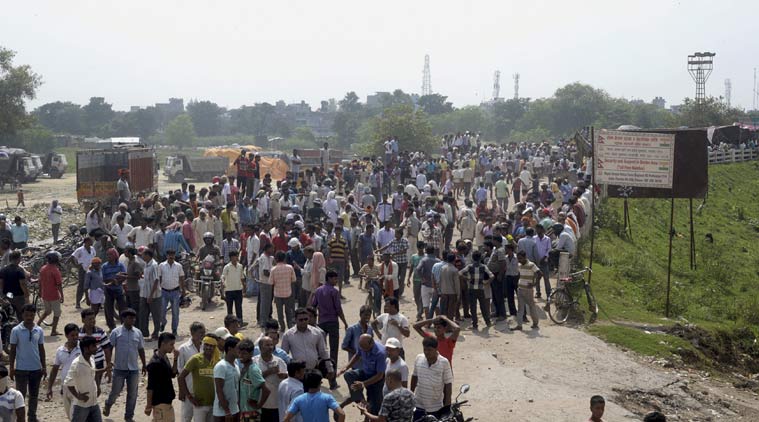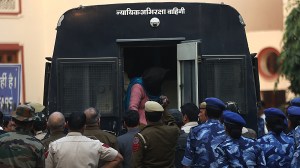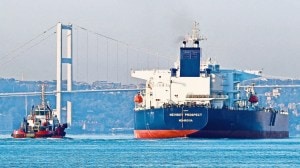Stay updated with the latest - Click here to follow us on Instagram
Nepal protests: 9 injured as clashes erupt at Nepalgunj border
Clashes ensued between cadres of the Madhesi Front and security personnel at the Nepalgunj border, leaving four security personnel and five demonstrators injured.
 Nepalese people and Madhesi party leaders block a bridge in Birgunj, a town on the border with India, around 300 kilometers (200 miles) east of Kathmandu, Nepal, Friday, Sept. 25, 2015. (Source: AP photo)
Nepalese people and Madhesi party leaders block a bridge in Birgunj, a town on the border with India, around 300 kilometers (200 miles) east of Kathmandu, Nepal, Friday, Sept. 25, 2015. (Source: AP photo)
Clashes broke out on Saturday between protesters opposing Nepal’s new Constitution and security personnel in Nepalgunj district near the border with India, injuring at least nine people, as the unrest over the promulgation of the statute refused to die down.
Clashes ensued between cadres of the Madhesi Front and security personnel at the Nepalgunj border, leaving four security personnel and five demonstrators injured.
The Madhesi cadres reached Rupaidiya customs point this morning to create obstruction as part of their protest programme. When police tried to disperse the crowd, the protesters resorted to stone pelting. The injured people were being treated in Nepalgunj.
[related-post]
The clashes near the border came a day after hundreds of protesters opposing the new Constitution blocked a key trade checkpoint on the Indo-Nepal border. India had on Friday again pressed for addressing of the unrest in this country “credibly and effectively”.
Hundreds of trucks loaded with essential goods, cooking gas cylinders and petroleum products are stalled at the Nepal-India border due to the ongoing agitation in the Terai plains of the Himalayan nation.
The protesters belonging to the Joint Madhesi Front are opposing the provision in the new Constitution that divides the country into seven federal provinces.
The agitating Madhesi Front claims that the Constitution does not guarantee enough rights and representation to the Madhesi and Tharu communities residing in southern Nepal.
Madhesis are Indian-origin inhabitants of the Terai plains bordering India. At least 40 people have died in over a month of clashes between police and protesters from the Madhesi and Tharu communities and ethnic minorities.
The blocked checkpoint in Birgunj which lies 200 km south of the capital, serves as a major transit point between Nepal and India. With the blockade on supply of essential goods to Nepal due to unrest in the country’s southern plains, Chinese officials have indicated that they were ready to open two trading points between Nepal and China – Tatopani and Rasuwagadhi.
The two points remain blocked due to the April 25 earthquake and subsequent landslides in the area. According to Nepalese Ambassador to China Mahesh Maskey, Chinese Deputy Minister for South and South East Asia Chhan Fenshyang was positive about opening the trading points before the festival season.
Meanwhile, Prime Minister Sushil Koirala reached Kailali district on Saturday to take stock of the security situation, following the Tikapur incident in which nine people, including seven police personnel, were killed on August 24. Koirala was accompanied by the chiefs of the Nepal Army and Nepal Police and secretary of the Home Ministry among others.



- 01
- 02
- 03
- 04
- 05




























